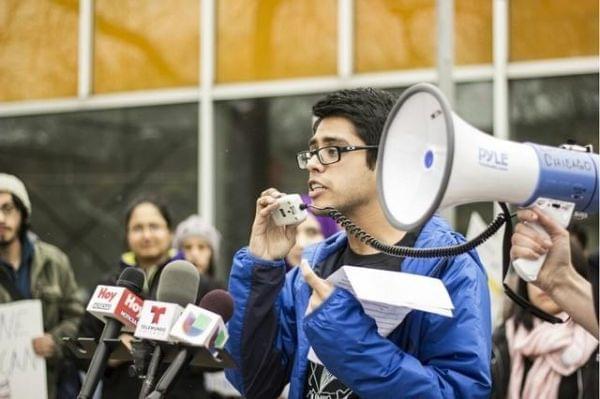Illinois Issues: Worry About DACA’s Fate Triggers Anxiety, Depression In Immigrants

Luis Gomez speaks at a pro-immigration rally in Chicago last year. Daisy Contreras/NPR Illinois
Luis Gomez says his anxiety has been exacerbated by the ongoing debate over whether to end DACA.
Last month, the Trump administration announced it was terminating the Deferred Action for Childhood Arrivals program — also known as DACA.
Created by President Barack Obama’s 2012 presidential order, DACA grants undocumented youth who entered the country as children temporary protection against deportation, as well as the right to work.
After meeting a few days later with U.S. Senate Minority Leader Chuck Schumer and House Minority Leader Nancy Pelosi — President Donald Trump softened his original statement, saying he was open to making DACA permanent. But he backed away from that tweet once he heard backlash from conservative Republicans.
Elgin resident Gomez, 22, who entered the country illegally at the age of 11, says, “This whole negotiation has me very anxious and in the way that I haven’t felt in years, and talking to other undocumented folks it also has them anxious and a lot of them have receded into forms of depression and other mental health episodes.”
The U.S. government won’t accept new DACA applications. Two-year renewal applications for those whose DACA status expires before March 5 had to be received in the mail today, creating potential for added anxiety. The Trump administration gave Congress six months to act on the program in some form and several bills are under consideration, including one co-sponsored by U.S. Sen. Dick Durbin that aims to protect DACA holders for an additional three years if Congress can’t come to a decision.

A protest against the Trump administration's decision to rescind DACA in Chicago Sept. 7, the day after U.S. Attorney General Jeff Sessions announced the decision.
The back-and-forth is worrying for Gomez, but he says he has seen it before. It has implications for his community “because a lot of the older folks who didn’t live under DACA have sort of this like flashbacks to 2010 and how devastating it was, truly devastating, to see a deal made and then broken so easily,” he says. Congress nearly approved immigration reform seven years ago, including provisions that would have given so-called DREAMERs legal status. And many of the same players, Durbin, Pelosi and Schumer, were involved then, too.
“I am worried about people because this whole game between Schumer, Pelosi and Trump has real effect on people. And you can see people are not as happy as they used to be, and people are very down. I just worry because some of them I have talked to myself, they have thoughts about taking their lives.”
Psychologists who work with DACA recipients say the uncertain future of the program harms the mental health of those immigrants – 42,000 of whom live in Illinois. And a recently published Stanford University Immigration Policy Lab study found that children’s mental health improves when their mothers are eligible for DACA.

Rebecca Ford-Paz is a psychologist at Ann & Robert H. Lurie Children’s Hospital of Chicago, specializing in mood and anxiety disorders and Latino mental health.
“Being of undocumented status is really a huge source of anxiety,” says Rebecca Ford-Paz, who is a psychologist at Ann & Robert H. Lurie Children’s Hospital of Chicago. She specializes in mood and anxiety disorders and Latino mental health. “That you could be discovered and forcibly separated from your family through deportation is clearly traumatic and threatening especially due to many immigrant populations’ emphasis on the centrality of family.”
Trump’s tempered language on DACA might have created hope, but it appears more likely to have produced negative emotions among immigrants.
Ford-Paz says, “I think the yo-yoing contributed to an ongoing sense of panic, hopelessness, and helplessness because they might be separated from their family and they might be returned to life-threating circumstances in a country that is completely unfamiliar to them. And there is no current pathway to citizenship for these young people; there is no existent option that will change things for the better for them.’’
Psychologist Elena Quintana agrees. She is the executive director of the Institute on Public Safety and Social Justice at Adler University in Chicago.

Psychologist Elena Quintana is the executive director of the Institute on Public Safety and Social Justice at Adler University in Chicago.
She says it is not “rocket science” to see that the chance to come out of the shadows with the institution of DACA “is a real boom to growth and development.’’
“It is incredibly positive to be able to gain those things, and to lose them is incredibly crushing,” she says. “But it’s not just crushing, but it creates this kind of immediate depression and anxiety that also includes physical ailments.”
Losing DACA status is an “enormous event,” Quintana says. The effects are psychological, economic and cultural, and the resulting stress, and stress hormones, can lead to physical ailments that have warning signs for future generations, she says.
“It’s not just bad for one generation of people it’s bad for multiple generations of people.”
Especially at risk are those who have a pre-existing risk factor for mental illness, Ford-Paz says.
“When we think about different population subgroups impacted by the current social political climate, many people have multiple intersecting identities, such as an individual might not only identify as a DACA recipient but also as black or gay or Muslim. So those individuals may be at increased risk for the fact that they have more than one of those identities so among individuals that are especially vulnerable going … who have pre-existing risk factors for depression and anxiety like a history of depression or anxiety disorders or prior suicide attempts or self-injury, substance abuse, impulse aggressive behavior or those who are social withdrawn."
She says, people at-risk include “visible minorities” because of their “skin color or their style of dress, like if they wear a hijab, if they are gender non-conforming, if they are recipients of DACA and have family members who may be undocumented and are experiencing some of the same distress and those with limited English efficiency.”
To receive DACA status, the recipients had to give up identifying information which could have led to consequences such as deportation for family members without documentation.
“So DACA kids took a huge risk that this program would help them regularize their status and make things right so they registered with the government and gave the government all of their personal information and when DACA was extended, DACA recipients worst fears were coming true,’’ Ford-Paz says. “It wasn’t enough that they were law abiding, that they were at the top of their class, that they were paying taxes and they were contributing to our society. Now the government knows where they live, and where their families live. So now they have not only risked their own security and ability to stay in the country, but they have also risked the same for their family members. So now on top of the daily anxiety about deportation they are also experiencing increased guilt.”
Gomez says some of the anxiety comes from fear of what could happen to family members who lack DACA status.
“If harsher immigration enforcement comes into being that means our parents and other community members are at a higher risk of being taken away,” says Gomez, who works with an organization that deals with efforts for reform that advocate for protection of all immigrants, regardless of age or DACA-eligibility.
Some people, of course, don’t care for DACA or reform that would lead to more immigration.

Dave Gorak is the executive director of the Midwest Coalition to Reduce Immigration.
Dave Gorak, executive director of the Midwest Coalition to Reduce Immigration, says he doesn’t have the qualifications as a psychologist or social worker to comment on mental health status of DACA recipients. His opposition to the program is rooted in a legal argument.
“Perhaps you should ask the perspective of their parents who made the deliberate decision to enter this country illegally and put their children in harm’s way,” he says. “Better still, why not contact those members of Congress who for years looked the [other] way while our immigration laws weren’t being enforced? Are they not complicit in creating this crisis?”
He says he is more troubled by lawmakers who are “a direct assault on the very foundation on which this republic rests.”
“What these individuals are saying is this: ‘The American people have no right to enforce their own immigration laws that were created to protect them and their jobs;’ in short, they are being told to surrender their sovereignty.”
Durbin, a long-time proponent of immigration reform, told Illinois Issues earlier this year, “Young people like those DREAMers, and those protected by DACA, young immigrants — historically take some of the toughest, dirtiest, least liked jobs in America. That’s what immigrants do. There is not a long line of Americans waiting for that opportunity.” He says many DACA recipients are working those jobs to pay their way through college, where they have limited access to scholarships.
Durbin says he wants comprehensive reform that includes immigrants outside the perimeters of DACA.
Meanwhile, organizations that work with immigrants had heightened awareness of potential mental health issues even before Trump took office and by the talk of canceling DACA.

Fred Tsao is senior policy counsel for the Illinois Coalition for Immigrant and Refugee Rights.
Fred Tsao is senior policy counsel for the Illinois Coalition for Immigrant and Refugee Rights.
“Particularly after the election with the spread of further enforcement activity and the (potential end of) protections like DACA, we picked up our efforts and organized mental health professionals and other leaders to work on immigrant mental health,” he says. “In fact, there is a coalition for immigrant mental health that we are part of that is trying to address the needs of immigrant communities particularly documented individuals.”
The end of the DACA program wasn’t unexpected, he says, but the effects are still devastating to the approximately 800,000 immigrants who participate in the program, including 42,000 in Illinois.
“So many of these young people are wondering what is going to happen to them now. Are they still going to be able to support themselves and make money to fund their education or support their families? Are they going to be safe from deportation?” he asks. “All these extra worries and concerns, of course, will take its toll on the emotional well-being of these individuals. So, we’re trying to do what we can to address the need; many others are trying to do the same.”

Ford-Paz says many families she works with are looking for resources or legal advice to figure out options, and that’s taking a toll. “Families are definitely planning for the worst and are working on family preparedness plans, working out guardianship agreements in the event that family members are deported and children are going to be in need of caregivers,” she says. “So, there are certainly higher levels of anxiety, sleep disturbance and nightmares all of which are precursors to depression.”
Illinois Issues is in-depth reporting and analysis that takes you beyond the headlines to provide a deeper understanding of our state. Illinois Issues is produced by NPR Illinois in Springfield.
Links
- Illinois Issues: Coming Up In The Veto Session
- Illinois Issues: We Have Met The Enemy And He Is Us
- Illinois Issues: A Master Of Compromise Exits
- Illinois Issues: The Man With The Education Reform Mission
- Illinois Issues: No Money For Shoes
- Illinois Issues: Flat Vs. Graduated Income Tax
- Illinois Issues: Cairo Faces Public Housing Crisis
- Illinois Issues: ERA — Yesterday And Today
- Illinois Issues: The Experts’ Take On The Budget
- Illinois Issues: The Prairie State’s Nuclear Waste Conundrum

